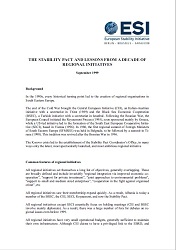ISOLATING KOSOVO? Kosovo vs Afghanistan 5:22
ISOLATING KOSOVO? Kosovo vs Afghanistan 5:22
Author(s): Author Not Specified
Subject(s): Governance, International relations/trade, EU-Approach / EU-Accession / EU-Development
Published by: ESI – European Stability Initiative
Keywords: Schengen; visa-freedom; conditionality; Kosovo isolation;
Summary/Abstract: In May 2008 the European Union launched a visa liberalisation process for the Western Balkans. It defined a list (roadmap) of almost 50 strict conditions – from well-secured borders to regulated asylum procedures, from forgery-proof passports to improved international police cooperation – that Albania, Bosnia Herzegovina, Macedonia, Montenegro and Serbia would have to meet in order to benefit from visa free travel. It also created a progress assessment mechanism involving experts from the Commission and member states. The basic idea was that the liberalisation process, as long as it was strict and fair, would serve the interests of both the EU and the region. || One hope was that the period of uncertainty and isolation which had started with the dramatic collapse of the Yugoslav Socialist Federation in 1991 was coming to an end. Another was that the enormous obstacles to free travel facing all Kosovo residents – obstacles which had been put in place in 1991 – could finally be overcome. All this would not be easy, people acknowledged. It would require institutions and reforms, just as elsewhere in the Balkans – but there would now at least be a perspective for Kosovars to rejoin the European mainstream. || So far, however, these hopes have not been realized. Kosovo citizens are more isolated now, in terms of visa requirements, than at any point in the last half-century. Kosovo remains one of the most isolated places on earth.
Series: ESI Discussion Papers
- Page Count: 9
- Publication Year: 2009
- Language: English
- Content File-PDF

